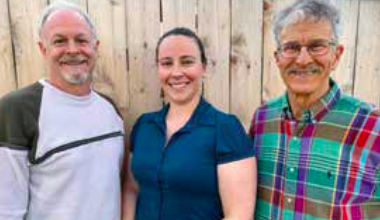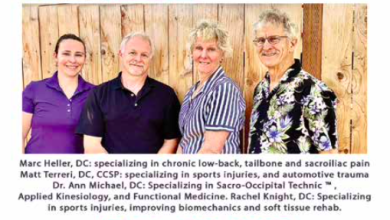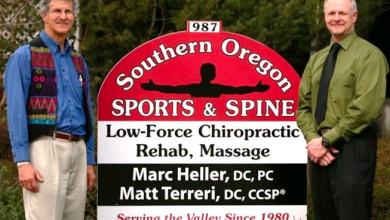An Interview with Dr. Marc Heller, of Southern Oregon Sports and Spine
Dr. Heller, how long have you been practicing chiropractic?
I was a massage therapist for seven years, and then opened my chiropractic practice in Ashland in 1980, 35 years ago.
What has influenced the style of chiropractic that you practice?
I always preferred gentle non-thrust adjustments for my own body, so I learned to use them on others. I always wanted to know how to maintain my own health, so I focused on learning rehab methods. We tend to attract patients who want to be part of their own care, rather than those who just want us to fix them.
What events have shaped your life as a chiropractor?
One is my own experience of chronic lower back pain, which taught me so much. Second, writing a regular column for a national chiropractic journal, Dynamic Chiropractic for the last 11 years. This opportunity to synthesize, teach and share has changed the way I practice. Third, in 1994 I had the opportunity to work in a multi-disciplinary spine center, run by Dr. Jim Dunn, a neurosurgeon. This was an amazing experience for me. It taught me how much more there is to know about back pain. It made me realize how much I could learn from the osteopaths and physical therapists. It taught me how important teamwork is, and how different practitioners could all work together; with the goal of optimal care for the individual patient.
What are you most grateful for in your career?
I’ll start by thanking my wonderful office staff, led by Barbara Hansen, who has worked with me for 29 years. My wife, Beth Heller, LMT, has worked with me for over 25 years, and has shared advanced training with our team of massage therapists. I am very grateful to my partners, Matt Terreri, DC and Heather Escobar, DC. They are both wonderful, compassionate, and highly skilled doctors. I am so grateful for opportunity to help so many people.
What would you like to share with people who suffer from pain?
First, don’t give up. Start treatment with the safest, least invasive methods. It is easy to forget how much risk there is with aggressive medical treatment. The goal is not always to be cured; sometimes the goal has to be to learn to manage the pain, and have it no longer be the center of your life. Be an active part of your own care, asking questions, and fully participating in the your care. Do your exercises faithfully. Listen to your own guidance and common sense; if something doesn’t feel right, either stop it, or get your questions answered.
It sounds like you still have passion for what you do.
I am very lucky. After 35 years, I still love my work. I learn something new every day, help people, and get to share with many others.



